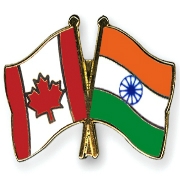Canada Recalls Diplomats from India Amid Ongoing Standoff
In the midst of a diplomatic standoff between India and Canada, the Canadian government made a significant announcement on October 20, revealed that 41 diplomats and their family members stationed in India had been recalled. The reason for this recall was the perceived threat of having their diplomatic immunity revoked on an arbitrary date, which could potentially jeopardize their personal safety.
India’s Unilateral Decision
The root of this diplomatic tension began when India informed Canada of its intention to unilaterally remove diplomatic immunities for all but 21 Canadian diplomats and their dependents in Delhi, effective October 20. This move was in response to India’s request for “parity” with Canada, seeking a balanced number of diplomats in each other’s countries.
The Trudeau Controversy
The ongoing dispute can be traced back to Canadian Prime Minister Justin Trudeau’s remarks in the Canadian Parliament in September 2023. Trudeau had suggested a potential link between the Indian government and the assassination of Hardeep Singh Nijjar, a pro-Khalistan separatist leader killed in Canada earlier in the year. India vehemently rejected these claims, labeling them as “absurd” and “motivated.”
India’s Response
India pushed back against Canada’s arguments, with the Ministry of External Affairs (MEA) stating that the unilateral revocation of diplomatic privilege and immunity goes against international law and constitutes a violation of the Convention on Diplomatic Relations. The MEA defended its stance by highlighting the higher number of Canadian diplomats in India and their perceived interference in India’s internal affairs, justifying the call for diplomatic parity.
Understanding the Vienna Convention
- The Vienna Convention on Diplomatic Relations, a United Nations treaty established in 1961, sets forth fundamental principles and terms for how countries should treat each other’s diplomatic representatives.
- Diplomatic immunity, a key aspect of the convention, provides diplomats with exemptions from certain laws and taxes in the host country to ensure their ability to function without fear or intimidation.
Relevant Articles from the Vienna Convention
- Article 29 of the convention declares the inviolability of a diplomatic agent’s person, ensuring they are not liable to arrest or detention in the host country. It also requires the receiving state to treat them with due respect and protect their person, freedom, and dignity.
- Article 9 empowers the receiving state to declare any member of the diplomatic staff as persona non grata or unwelcome without providing an explanation. In such cases, the sending state must either recall the individual or terminate their functions within the mission. Failure to comply may result in the receiving state refusing to recognize the person as a member of the mission.
- Article 11 addresses the size of diplomatic missions, allowing the receiving state to request a reasonable and normal mission size based on circumstances and conditions in the host country.
Recalling Diplomats as a Form of Diplomatic Response
The Vienna Convention’s provisions, including Article 11, provide the framework for states to seek parity in the presence of diplomats. In India’s case, this request for parity was prompted by concerns of continuous interference in its affairs by Canadian personnel.
Historical Precedents
It’s worth noting that diplomatic recalls based on the principle of parity are not unprecedented. In 2017, both Russia and the United States requested the recall of each other’s diplomats and reduced the presence of their missions due to strained relations.
Month: Current Affairs - October, 2023
Category: International / World Current Affairs






